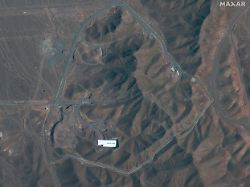Confidential Report
IAEA: Iran stocks up on 60 percent uranium to 114 kilos
05/31/2023, 8:38 p.m
In recent months, Iran has been producing uranium by the kilo with near-weapons-grade purity. The IAEA is suspicious of what is happening in the country. The inspections are happier when it comes to cooperation with Tehran. However, they do not have a full perspective.
Iran has yet to fully implement its recent commitments to international nuclear inspectors. This emerges from a report by the International Atomic Energy Agency (IAEA) in Vienna. In March, IAEA chief Rafael Grossi negotiated during talks in Tehran that his agency would again be able to monitor the country’s nuclear program more closely and that it would receive information about formerly secret nuclear facilities.
In April and May, Iran allowed the IAEA to install cameras and gauges to monitor uranium enrichment, the non-public report said. However, the IAEA has no access to the camera recordings and the measuring devices have not yet been calibrated, it said. Grossi therefore called for a “persistent and consistent” expansion of surveillance.
The IAEA went a step further in clarifying open questions about secret nuclear activities in three plants in the past. Iran had provided explanations for one of the systems, which is why this part of the complex of questions is being closed for the time being, it said. Details of the other two plants remain unclear.
84 percent uranium as an unintended technical cause
In addition, Grossi reported that Iran has continued to produce additional uranium with near-weapons-grade purity in recent months: Among other things, the country has increased its 60 percent uranium by almost 27 kilograms to 114 kilograms. An enrichment level of around 90 percent is required for nuclear warheads.
In January, IAEA inspectors also discovered particles of 84 percent uranium. In the meantime, however, Iran has been able to make it credible that this extremely high value was temporarily caused by an unintended technical cause, the IAEA reported.
In order to prevent the construction of Iranian nuclear weapons, several countries, including Germany, signed an agreement with Tehran in 2015. Iran’s nuclear program was curtailed in exchange for Western sanctions being lifted. But the United States, under President Donald Trump, withdrew from the pact in 2018. After that, Tehran gradually broke its commitments, for example through higher-grade uranium enrichment or through restrictions on IAEA inspectors.
